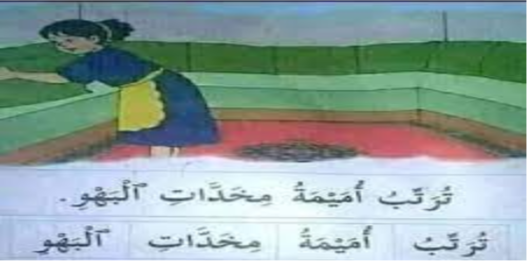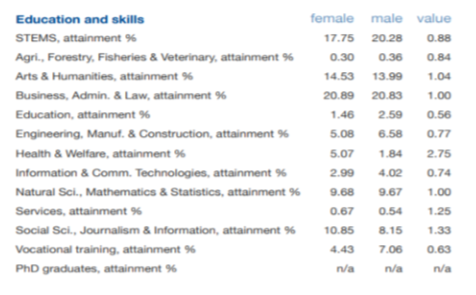Mind the Gender Gap in Education
Contemplate the intersection and take the next roundabout
Par Sara El Ouedrighi
No, this is not a driving lesson. This is rather a call to action. An advocacy to consider a 360° gender analysis that proactively acknowledges, demystifies and deconstructs the entanglement of gender discrimination’s intersectional dimensionality.
Past two mosques, three bars disguised as Shisha cafés, a park that turns at night into an open-air free hostel for the homeless and glue sniffers, and across countless mechanic workshops, I climbed up, every single day, for nine years, a hill leading to my school.
The nine arduous years weren’t enough to count all the mechanic workshops scattered everywhere. It did, however; enable me to memorize almost every single face that worked there or frequented the place. In a military-like scene, all workers would crowd around the entrance of what was a common meeting point for primary and secondary schools. Lined-up at every bell ring, the workers would wait, gaze, call names and throw curses and sometimes sudden and forced touches onto the little bodies that passed by. This taught me from a very young age to believe that the space inside the school was at least safer than the outside world. It taught me also that the space inside my house, or so I drove myself to think, was the safest; although it never felt, or been so.
We used to run away as fast as our little feet allowed us from the crowd downhill towards home. We never dared to speak about that. Even today when I still walk that same exact road and see those exact same faces. Faces that never change, as if the universe conspires a common plot with them to never erase the feeling of fear, of self-disgust and the shame they made us feel and interiorize “Walk fast, lower your gaze, bow your head”, “Don’t run, this incites them!”, “Run when they start talking or staring”, “You had it coming”, “Bnat nass shouldn’t leave their homes”, “Ach darou li 9bel mnkoum bhad l9raya“ (what good has schooling brought upon those who pursued it before yourselves). Passersby were very generous at throwing these remarks at us whenever they eyewitnessed an incidence where a girl would stand up for herself or her friends. If a mother mastered the courage to revolt, well, the word starting with a Qaf in Arabic was the easy, generous and instantaneous reply she would get.
Fear of the word that starts with Qaf and all it represents still hinders many girls from education. Dropping out at an early age or never accessing school is the first gap that comes to our minds when the topic of gender and education is brought to the table.
Around the world, UNICEF shows that 129 million girls are out of school. The number of girls dropping out increases as education levels go higher. Data from UNICEF indicate that around 67 million girls at the age of upper-secondary education are out of school, 30 million at the level of lower-secondary education and 32 million at primary education age. Social, economic, cultural, religious, ethnic and sexual factors intertwine to form a mechanism of exclusion of girls from education which dictates the manner in which societies place value on the education of girls and boys alike. The result oft-times is the prioritization of domestic work and reproduction roles for girls, education (if applicable and possible) and work for boys.
In addition to spatial disparities (of which I only captured the fraction of a fraction), other inequalities still plague the educational system. Harassment and gender-based violence inside and outside the school. Discrimination and gender-blindness in monitoring the school curricula and environment (examples here can be given of particular stereotypical imaging rampant in educational curricula).

The compartmentalisation of education between male and female disciplines is also another facet of discrimination in the educational milieu. The latest World Economic Forum Gender Gap report (2021) demonstrates in numbers the disparities of gender representation between the fields of STEM and the humanities.

The division of educational fields reflects directly on the division of roles and positions within the professional sector. Fewer women, all around the world, occupy leadership positions under the infamous glass ceiling, even less women occupy positions in STEM-related fields of work. The numbers of female workers increase notably in fields related to care: social work, nursing, education…
On the same line, these divisions reflect on the wage gap between men and women and the unfair load of work placed upon women in their double day shifts – at work and at home.
One more year in school gives women and girls a million more opportunities for a better present and future. It gives them more chances to access the formal workforce, delay (unwanted) marriages and pregnancies. It gives them the voice to say ‘NO’ to violence, to discrimination, to segregation. It enables them to be better human beings, better women, better universal citizens, better selves. One more year isn’t enough however for the world of the 21st century with all its challenges on the one hand and amazing potentials on the other. We need more years of quality education in all fields.
On a last note, that should absolutely be not last in our quest as feminists, boys too should feel included in our discourse. Sometimes in our activism for women’s rights, we forget to say that our toil includes ‘YOU TOO’. Our belief in gender equality involves men and women and all that do not identify as simple such. Boys too are forced in certain contexts to assume responsibilities far beyond their age. They are forced to curb their emotions and silence their quaking minds and hearts.
A proper education, where gender neutrality and democratic civic values are reflected is the only way for a better future for us all. If we start teaching the new generation today about their rights, tomorrow for sure will be brighter, will be better, will be more equal.
10/03/2022
Back to the seventies – At the cafeteria ‘The Cave’ of the School of Arts and Humanities Dhar El Mehraz – Fès
